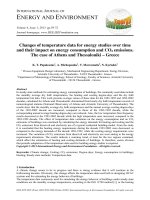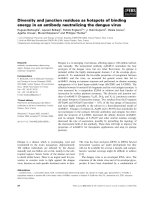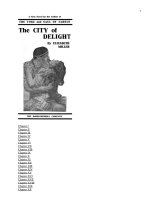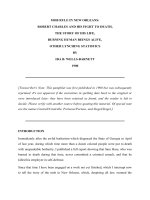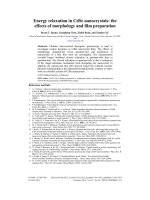Bly, robert winged energy of delight, selected translations, the
Bạn đang xem bản rút gọn của tài liệu. Xem và tải ngay bản đầy đủ của tài liệu tại đây (1.01 MB, 418 trang )
T H E W I N G E D E N E RGY
OF DELIGHT
,
Selected Translations
Rober t Bly
contents
some words about
this book
Tomas Tranströmer
Mirabai
Kabir
Antonio Machado
Juan Ramón Jiménez
Francis Ponge
Pablo Neruda
Georg Trakl
Rainer Maria Rilke
Basho
Rolf Jacobsen
Gunnar Ekelöf
Issa
Federico García Lorca
Olav H. Hauge
Harry Martinson
César Vallejo
Miguel Hernandez
Rumi
Horace
Ghalib
Hafez
permissions
index
About the Author
Praise
Other Books by Robert Bly
Credits
Cover
Copyright
About the Publisher
v
1
21
37
57
81
99
111
137
155
179
189
207
219
229
257
273
291
311
331
349
361
377
399
402
some words about this book
During The Fifties, there was very little sense in the poetry
community of contemporary European and South American poetry.
While in Norway a few years later I found Paal Brekke’s anthology
Modernistisk Lyrikk (The Modern Poem). He included one poem apiece
by seven or eight lively poets from each of the major European countries. There was a great freshness in many of these poets. How was it
that I had never seen the names of Trakl, Ekelöf, or Vallejo in contemporary American magazines? Many of these poets engaged in an
explosive attention to metaphor.
Back in the United States, after driving away one day to a distant
library to find a copy of a Tranströmer book called Den Halvfärdiga
Himlen (Half-Finished Heaven), I found on my return a letter from
Tranströmer directed to James Wright, a poem of whose he had read in
The Times Literary Supplement. So some poets in Europe were alert to any
movement in the world of the image. I soon translated some of Tomas
Tranströmer’s poems, and James Wright and I did the first book of
Trakl’s poems into English. Later we translated Vallejo, Neruda, and
Jiménez together. Translating allows one to go deeply into the adventures taking place inside another person’s poem; translating with friends
is one of the greatest pleasures in the world.
Wright and I depended on Hardie St. Martin, who had a Spanishspeaking mother and an American father, and knew both languages in
the cradle. His care and love lie behind all our translations from the
Spanish. Tranströmer, whose English is excellent, gave me much help on
English versions of his poems. I had no help on Rilke, and depended on
vi
| some words about this book
my own German, which was probably not good enough. In a little book
called The Eight Stages of Translation, I follow a single sonnet of Rilke’s
through the eight stages that I detected from my own practice. This
booklet attempts to show how complicated the process of translation is,
and how many errors one can fall into. When I have had no help with the
language at all, as was the case with my early work on Kabir, I call those
poems “versions” instead of translations. My Kabir poems are rewritings
of the translations into colonial English made by Rabindranath Tagore
in the 1920s. Even in his stodgy English, one could feel the astounding
courage and brilliance of Kabir. The Mirabai poems have evolved from
word-by-word translations which were given to me by the East Asian
Language Department of the University of Chicago. For the Ghalib
poems, my son-in-law, Sunil Dutta, made literal translations from the
Hindi with elaborate commentaries in English on each line. In my still
more recent translations of Hafez, I have had help from an unfailingly
fierce and generous scholar of Iranian literature, Leonard Lewisohn.
When Hugh Van Dusen at HarperCollins first suggested that I
gather together a large group of my translations in a single book, I
was delighted to have the chance. But given that twenty-two poets
were to be included, it wasn’t at all clear in what order they should
come. Arrangement by birthdate didn’t seem right, because the book
would then begin with Horace, but Horace is most interesting to people familiar with the work done during recent decades on the image
and its importance in argument. Arranging the poems by the order in
which my translations got published didn’t make sense either, because
some translations had to wait years. Finally, my daughter, Bridget,
said, “Why don’t you publish them in the order in which you first
loved them?” That idea is the one I settled on for this book.
The most important gift we receive when translating is to see
genius—in Mirabai, Rumi, Lorca, Ponge—shine straight through
into the world.
tomas tranströmer
Tomas Tranströmer comes from a long line of ship pilots who
worked in and around the Stockholm Archipelago. He is at home on
islands. His face is thin and angular, and the swift, spare face reminds
one of Hans Christian Andersen’s or the younger Kierkegaard’s. He has
a strange genius for the image—images come up almost effortlessly. The
images flow upward like water rising in some lonely place, in the
swamps, or deep fir woods.
Swedish poetry tends to be very rational, and therefore open to
fads. Tranströmer, simply by publishing his books, leads a movement
of poetry in the opposite direction, toward a poetry of silence and
depths.
One of the most beautiful qualities in his poems is the space we feel
in them. I think one reason for that is that the four or five main images
that appear in each of his poems come from widely separated sources
in the psyche. His poems are a sort of railway station where trains that
have come enormous distances stand briefly in the same building. One
train may have some Russian snow still lying on the undercarriage,
and another may have Mediterranean flowers still fresh in the compartments, and Ruhr soot on the roofs.
The poems are mysterious because of the distance the images have
come to get there. Mallarmé believed there should be mystery in
poetry, and urged poets to get it by removing the links that tie the
poem to its occasion in the real world. Tranströmer keeps the link to
the worldly occasion, and yet the poems have a mystery and surprise
that never fade, even on many readings.
2
| tomas tranströmer
Rilke taught that poets should be “bees of the invisible.” Making
honey for the invisible suggests that the poet remain close to earthly
history, but move as well toward the spiritual and the invisible.
Tranströmer suspects that as an artist he is merely a way for “the
Memory” to get out into the world. Even at seventeen he was aware
that the dead “wanted to have their portrait painted.” Somehow that
cannot be done without making peace with rhetoric. He wants to tell
of spiritual matters, but he doesn’t want to be a preacher. If rhetoric
could kill Christianity in Sweden, maybe it could kill poetry as well. In
“From an African Diary,” he describes climbing on a canoe hollowed
from a log:
The canoe is incredibly wobbly, even when you sit on your heels.
A balancing act. If you have the heart on the left side you have
to lean a bit to the right, nothing in the pockets, no big arm
movements, please, all rhetoric has to be left behind. Precisely:
rhetoric is impossible here. The canoe glides out over the water.
In “The Scattered Congregation,” Tranströmer remarks:
Nicodemus the sleepwalker is on his way
to the Address. Who’s got the Address?
Don’t know. But that’s where we’re going.
Tomas Tranströmer was born in Stockholm on April 15, 1931.
His father and mother divorced when he was three; he and his mother
lived after that in an apartment in the working-class district of
Stockholm. He describes the apartment in the poem called “The
Bookcase.”
The early fifties were a rather formal time, both here and in
Sweden, and Tranströmer began by writing concentrated, highly formal poems, some in iambs and some in the Alcaic meter. His first
book, 17 Poems, published in 1954, glowed with strange baroque ele-
tomas tranströmer
| 3
ments, and contained only a few poems, but people noticed the power
of the book immediately.
For several years, he worked as a psychologist in a boys’ prison in
Linköping, and then in 1965, he moved with his wife, Monica, and
his two daughters, Paula and Emma, to Västerås, a town about forty
miles west of Stockholm. He continued to work as a psychologist, this
time for a labor organization funded by the State. He helped juvenile
delinquents to reenter society and persons with physical disabilities to
choose a career, and he counseled parole offenders and those in drug
rehabilitation.
Tomas Tranströmer’s poems are so luminous that genuine poetry
can travel to another language and thrive. His poems have been translated into dozens of European and Asian languages; at this moment,
something like thirty-eight.
The praise for his poems has steadily grown both in Europe and in
the United States. He has received most of the important poetry
prizes in Europe, including the Petrarch Prize in Germany, the
Bonnier Award for Poetry, the Pilot Prize in 1988, the Nordic
Council Prize in 1990, the Swedish Academy’s Nordic Prize in 1991,
and the Horst Bieneck Prize in 1992.
The town of Västerås recently had a formal farewell celebration in
the old castle for Tomas and Monica, who were moving to
Stockholm. A choir sang to him, and presents were piled up five feet
high around his chair.
Today, the couple live in an apartment in Stockholm overlooking
the harbor, near the old neighborhood where Tomas lived as a boy.
,
4
| tomas tranströmer
track
2 a.m.: moonlight. The train has stopped
out in a field. Far-off sparks of light from a town,
flickering coldly on the horizon.
As when a man goes so deep into his dream
he will never remember that he was there
when he returns again to his room.
Or when a person goes so deep into a sickness
that his days all become some flickering sparks, a swarm,
feeble and cold on the horizon.
The train is entirely motionless.
2 o’clock: strong moonlight, few stars.
tomas tranströmer
allegro
After a black day, I play Haydn,
and feel a little warmth in my hands.
The keys are ready. Kind hammers fall.
The sound is spirited, green, and full of silence.
The sound says that freedom exists
and someone pays no taxes to Caesar.
I shove my hands in my haydnpockets
and act like a man who is calm about it all.
I raise my haydnflag. The signal is:
“We do not surrender. But want peace.”
The music is a house of glass standing on a slope;
rocks are flying, rocks are rolling.
The rocks roll straight through the house
but every pane of glass is still whole.
| 5
6
| tomas tranströmer
morning bird songs
I wake up my car;
pollen covers the windshield.
I put my dark glasses on.
The bird songs all turn dark.
Meanwhile someone is buying a paper
at the railroad station
not far from a big freight car
reddened all over with rust.
It shimmers in the sun.
The whole universe is full.
A cool corridor cuts through the spring warmth;
a man comes hurrying past
describing how someone right up in the main office
has been telling lies about him.
Through a backdoor in the landscape
the magpie arrives,
black and white, bird of the death-goddess.
A blackbird flies back and forth
until the whole scene becomes a charcoal drawing,
except for the white clothes on the line:
a Palestrina choir.
The whole universe is full!
tomas tranströmer
Fantastic to feel how my poem is growing
while I myself am shrinking.
It’s getting bigger, it’s taking my place,
it’s pressing against me.
It has shoved me out of the nest.
The poem is finished.
| 7
8
| tomas tranströmer
out in the open
1
Late autumn labyrinth.
At the entry to the woods a thrown-away bottle.
Go in. Woods are silent abandoned houses this time of year.
Just a few sounds now: as if someone were moving twigs around
carefully with pincers
or as if an iron hinge were whining feebly inside a thick trunk.
Frost has breathed on the mushrooms and they have shriveled up.
They look like objects and clothing left behind by people who’ve
disappeared.
It will be dark soon. The thing to do now is to get out
and find the landmarks again: the rusty machine out in the field
and the house on the other side of the lake, a reddish square intense as
a bouillon cube.
2
A letter from America drove me out again, started me walking
through the luminous June night in the empty suburban streets
among newborn districts without memories, cool as blueprints.
Letter in my pocket. Half-mad, lost walking, it is a kind of prayer.
Over there evil and good actually have faces.
For the most part with us it’s a fight between roots, numbers, shades
of light.
The people who run death’s errands for him don’t shy from daylight.
They rule from glass offices. They mill about in the bright sun.
They lean forward over a desk, and throw a look to the side.
tomas tranströmer
| 9
Far off I found myself standing in front of one of the new buildings.
Many windows flowed together there into a single window.
In it the luminous nightsky was caught, and the walking trees.
It was a mirrorlike lake with no waves, turned on edge in the
summer night.
Violence seemed unreal
for a few moments.
3
Sun burning. The plane comes in low
throwing a shadow shaped like a giant cross that rushes over the
ground.
A man is sitting in the field poking at something.
The shadow arrives.
For a fraction of a second he is right in the center of the cross.
I have seen the cross hanging in the cool church vaults.
At times it resembles a split-second snapshot of something
moving at tremendous speed.
10
| tomas tranströmer
solitude
1
Right here I was nearly killed one night in February.
My car slewed on the ice, sideways,
into the other lane. The oncoming cars—
their headlights—came nearer.
My name, my daughters, my job
slipped free and fell behind silently,
farther and farther back. I was anonymous,
like a schoolboy in a lot surrounded by enemies.
The approaching traffic had powerful lights.
They shone on me while I turned and turned
the wheel in a transparent fear that moved like eggwhite.
The seconds lengthened out—making more room—
they grew long as hospital buildings.
It felt as if you could just take it easy
and loaf a bit
before the smash came.
Then firm land appeared: a helping sandgrain
or a marvelous gust of wind. The car took hold
and fishtailed back across the road.
A signpost shot up, snapped off—a ringing sound—
tossed into the dark.
Came all quiet. I sat there in my seat belt
and watched someone tramp through the blowing snow
to see what had become of me.
tomas tranströmer
2
I have been walking awhile
on the frozen Swedish fields
and I have seen no one.
In other parts of the world
people are born, live, and die
in a constant human crush.
To be visible all the time—to live
in a swarm of eyes—
surely that leaves its mark on the face.
Features overlaid with clay.
The low voices rise and fall
as they divide up
heaven, shadows, grains of sand.
I have to be by myself
ten minutes every morning,
ten minutes every night,
—and nothing to be done!
We all line up to ask each other for help.
Millions.
One.
| 11
12
| tomas tranströmer
the scattered congregation
1
We got ready and showed our home.
The visitor thought: you live well.
The slum must be inside you.
2
Inside the church, pillars and vaulting
white as plaster, like the cast
around the broken arm of faith.
3
Inside the church there’s a begging bowl
that slowly lifts from the floor
and floats along the pews.
4
But the church bells have gone underground.
They’re hanging in the sewage pipes.
Whenever we take a step, they ring.
5
Nicodemus the sleepwalker is on his way
to the Address. Who’s got the Address?
Don’t know. But that’s where we’re going.
tomas tranströmer
| 13
at funchal
(Island of Madeira)
On the beach there’s a seafood place, simple, a shack thrown up by
survivors of the shipwreck. Many turn back at the door, but not the
sea winds. A shadow stands deep inside his smoky hut frying two fish
according to an old recipe from Atlantis, tiny garlic explosions, oil
running over sliced tomatoes, every morsel says that the ocean wishes
us well, a humming from the deep places.
She and I look into each other. It’s like climbing the wild-flowered
mountain slopes without feeling the least bit tired. We’ve sided with the
animals, they welcome us, we don’t age. But we have experienced so
much together over the years, including those times when we weren’t so
good (as when we stood in line to give blood to the healthy giant—he
said he wanted a transfusion), incidents which should have separated us
if they hadn’t united us, and incidents which we’ve totally forgotten—
though they haven’t forgotten us! They’ve turned to stones, dark and
light, stones in a scattered mosaic. And now it happens: the pieces move
toward each other, the mosaic appears and is whole. It waits for us. It
glows down from the hotel-room wall, some figure violent and tender.
Perhaps a face, we can’t take it all in as we pull off our clothes.
After dusk we go out. The dark powerful paw of the cape lies
thrown out into the sea. We walk in swirls of human beings, we are
cuffed around kindly, among soft tyrannies, everyone chatters excitedly in the foreign tongue. “No man is an island.” We gain strength
from them, but also from ourselves. From what is inside that the other
person can’t see. That which can only meet itself. The innermost paradox, the underground garage flowers, the vent toward the good dark.
A drink that bubbles in an empty glass. An amplifier that magnifies
silence. A path that grows over after every step. A book that can only
be read in the dark.
14
| tomas tranströmer
schubertiana
1
Outside New York, a high place where with one glance you take in the
houses where eight million human beings live.
The giant city over there is a long flimmery drift, a spiral galaxy seen
from the side.
Inside the galaxy, coffee cups are being pushed across the desk, department store windows beg, a whirl of shoes that leave no trace behind.
Fire escapes climbing up, elevator doors that silently close, behind
triple-locked doors a steady swell of voices.
Slumped-over bodies doze in subway cars, catacombs in motion.
I know also—statistics to the side—that at this instant in some room
down there Schubert is being played, and for that person the notes
are more real than all the rest.
2
The immense treeless plains of the human brain have gotten folded
and refolded ’til they are the size of a fist.
The swallow in April returns to its last year’s nest under the eaves in
precisely the right barn in precisely the right township.
She flies from the Transvaal, passes the equator, flies for six weeks over
two continents, navigates toward precisely this one disappearing
dot in the landmass.
And the man who gathers up the signals from a whole lifetime into a
few rather ordinary chords for five string musicians
the one who got a river to flow through the eye of a needle
is a plump young man from Vienna, his friends called him “The
Mushroom,” who slept with his glasses on
and every morning punctually stood at his high writing table.
When he did that the wonderful centipedes started to move on the page.
tomas tranströmer
| 15
3
The five instruments play. I go home through warm woods where the
earth is springy under my feet,
curl up like someone still unborn, sleep, roll on so weightlessly into
the future, suddenly understand that plants are thinking.
How much we have to take on trust every minute we live in order not
to drop through the earth!
Take on trust the snow masses clinging to rocksides over the town.
Take on trust the unspoken promises, and the smile of agreement,
trust that the telegram does not concern us, and that the sudden ax
blow from inside is not coming.
Trust the axles we ride on down the thruway among the swarm of
steel bees magnified three hundred times.
But none of that stuff is really worth the trust we have.
The five string instruments say that we can take something else on
trust, and they walk with us a bit on the road.
As when the lightbulb goes out on the stair, and the hand follows—
trusting it—the blind banister rail that finds its way in the dark.
4
We crowd up onto the piano stool and play four-handed in f-minor,
two drivers for the same carriage, it looks a little ridiculous.
It looks as if the hands are moving weights made of sound back and
forth, as if we were moving lead weights
in an attempt to alter the big scale’s frightening balance: happiness
and suffering weigh exactly the same.
Annie said, “This music is so heroic,” and she is right.
But those who glance enviously at men of action, people who despise
themselves inside for not being murderers,
do not find themselves in this music.
And the people who buy and sell others, and who believe that
everyone can be bought, don’t find themselves here.
16
| tomas tranströmer
Not their music. The long melody line that remains itself among all its
variations, sometimes shiny and gentle, sometimes rough and
powerful, the snail’s trace and steel wire.
The stubborn humming sound that this instant is with us
upward into
the depths.
tomas tranströmer
| 17
vermeer
It’s not a sheltered world. The noise begins over there, on the other
side of the wall
where the alehouse is
with its laughter and quarrels, its rows of teeth, its tears, its chiming of
clocks,
and the psychotic brother-in-law, the murderer, in whose presence
everyone feels fear.
The huge explosion and the emergency crew arriving late,
boats showing off on the canals, money slipping down into pockets—
the wrong man’s—
ultimatum piled on ultimatum,
widemouthed red flowers whose sweat reminds us of approaching
war.
And then straight through the wall—from there—straight into the
airy studio
and the seconds that have got permission to live for centuries.
Paintings that choose the name: “The Music Lesson”
or “A Woman in Blue Reading a Letter.”
She is eight months pregnant, two hearts beating inside her.
The wall behind her holds a crinkly map of Terra Incognita.
Just breathe. An unidentifiable blue fabric has been tacked to the
chairs.
Gold-headed tacks flew in with astronomical speed
and stopped smack there
as if they had always been stillness and nothing else.
18
| tomas tranströmer
The ears experience a buzz, perhaps it’s depth or perhaps height.
It’s the pressure from the other side of the wall,
the pressure that makes each fact float
and makes the brushstroke firm.
Passing through walls hurts human beings, they get sick from it,
but we have no choice.
It’s all one world. Now to the walls.
The walls are a part of you.
One either knows that, or one doesn’t; but it’s the same for everyone
except for small children. There aren’t any walls for them.
The airy sky has taken its place leaning against the wall.
It is like a prayer to what is empty.
And what is empty turns its face to us
and whispers:
“I am not empty, I am open.”
